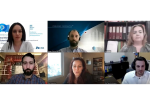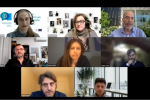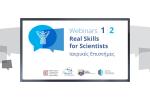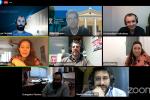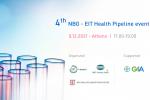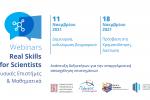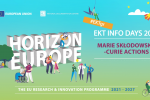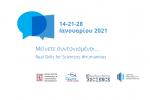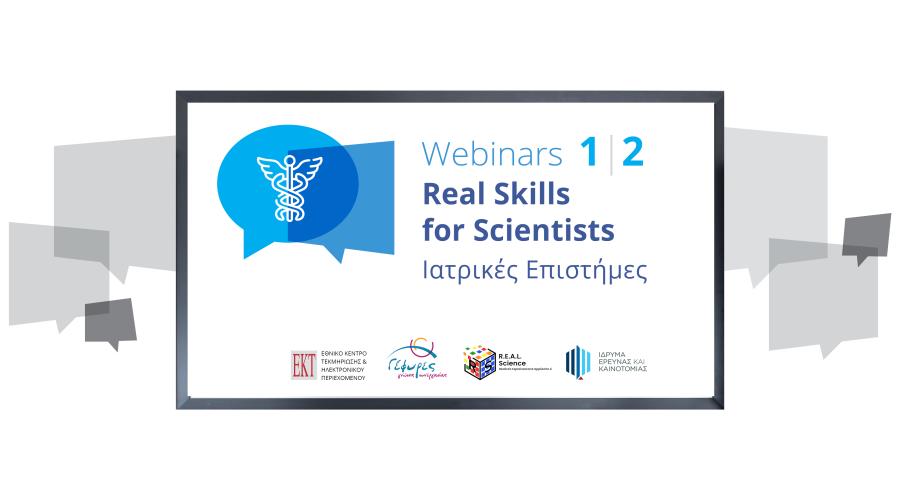
A large number of students and young researchers from Greece and abroad participated in the fifth cycle of webinars Real Skills for Scientists-Medical Sciences, held on 19 and 26 May 2022 by the National Documentation Centre (EKT), under the ‘Knowledge and Partnership Bridges’ Initiative, in collaboration with R.E.A.L. Science and the Cyprus Research and Innovation Foundation (RIF).
In the two webinars of the cycle, which aimed at developing personal skills for the professional careers of young researchers and scientists, participants heard useful tips and were able to ask experienced and renowned researchers from Greece and abroad about targeted actions for their professional development, CV creation and professional prospects in their particular area, as well as the opportunities for networking, finding financing and interconnecting with industry.
About 335 undergraduate and postgraduate students, PhD and postdoctoral candidates, faculty members, educators, students and researchers attended the webinars live. The audience consisted of Greeks and Cypriots joining the webinars not only from their homeland, but also from 14 additional countries of the world, including Germany, United States, United Kingdom, France, Norway, Slovenia, Chile, Spain, Belgium, Sweden, Switzerland, Austria , Cyprus - professionals, students and researchers working and/or studying abroad.
1st Webinar: Creating and strengthening a CV
The 5th cycle of Real Skills for Scientists started on Thursday, May 19, 2022 with four professional scientists representing the Medical Sciences who have professional careers in academia and business. The invited speakers, Dr. Vassilios Raftopoulos, Epidemiologist, Head of the Department of Epidemiological Surveillance of HIV / AIDS of EODY, Alexandra Petsiava, Pharmacy student at AUTh, Dr. Maria Dalouka, Anesthesiologist, Anesthesiology Clinic, University General Hospital of Larissa and Stefanos Bourlios, Specialist in Physical Medicine and Rehabilitation, shared their experiences and gave useful tips for professional development in the field.
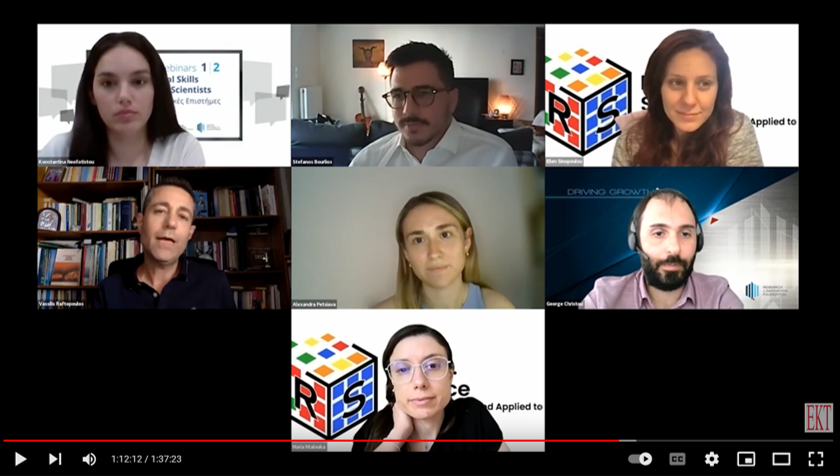
The speeches were opened by Dr. Vassilios Raftopoulos, who gave useful tips on preparing a CV for new entrants to the labour market: ‘It is very important to have a CV that can provide a suitable basis upon which to start to build ones dreams. It’s hard to find someone to do it for you. You may have neither the best CV nor the worst. Remember that we live in an internationalised environment and there may be other better ones outside the country. It’s very important to be networked and when we say networking it is really essential that this networking has a feedback character. Whenever we fail, it is an opportunity for improvement. Finally, reconcile yourself to the fact that you are doing something that won’t permanently accompany you.’
He was followed by Alexandra Petsiava who, from her student career so far, gave her own perspective, presenting ways to acquire skills within the school: ‘In the context of the school, what I have seen work is writing assignments, getting close to teachers and showing interest. Voluntarily gaining practical work experience in a laboratory. Attending seminars and conferences to have contact with the subject. Participating in voluntary or research groups and of course participating in laboratory or non-laboratory projects of the school’.
Dr. Maria Dalouka shared her personal career path, difficulties, lessons and the rewards. Closing the presentation, she pointed out: ‘No one achieved their goals without difficulty. Whoever tells you this, is lying to you or has not achieved their true goals but just does not know it. The fight is inhuman, but full of relaxed and wonderful moments. As you fight you will lose yourself, you will despair and you will fall ... we all suffered… take a breath, get up and fly even higher, you owe it to those who support you through the fight you have endured together so far and for the trials that you went through; you owe it to yourself,’
The round of presentations was closed by Stefanos Bourlios, who, referring to the labour market, said: ‘Jobs open up as needs arise, many of which we were not prepared for by the university. Take part in multidimensional education and remember the skills and abilities you learned can be transferred to a new environment. If you generally fit in with the workplace culture and are flexible, the employer will invest in you in the long run. You will be given opportunities for training and changes through the job’.
Finally, participants had a chance to ask the speakers questions about those skills that make young professionals more competitive in the job market, as well as alternative employment prospects in the Medical Sciences sector. The webinar ended with a reminder to participants about the 2nd webinar (26-06-22) on access to finance, networking and entrepreneurship.
Watch the video of the 1st webinar of Real Skills for Scientists- Medical Sciences. Webinar 1: Creating and strengthening a CV
2nd Webinar: Access to finance, networking and entrepreneurship
The 5th round of Real Skills for Scientists ended with the second webinar on Thursday, May 26, which focused on networking and community building, finding funding, and connecting with entrepreneurship. Invited speakers were Dr. Dimitris Papadopoulos, Doctor, Anesthesiologist, Doctor of Medical School of EKPA, Dr. Anna Maria Fantel, Postdoctoral Researcher, Department of Pharmaceutical Chemistry and Chemistry, Physical Medicine George Megas, Co-ordinator of EIT Health Hub Greece, ΕΚΤ and Prof. Triantaphyllos Stylianopoulos, Associate Professor of Mechanical Engineering and Head of the Cancer Biophysics Laboratory, University of Cyprus.
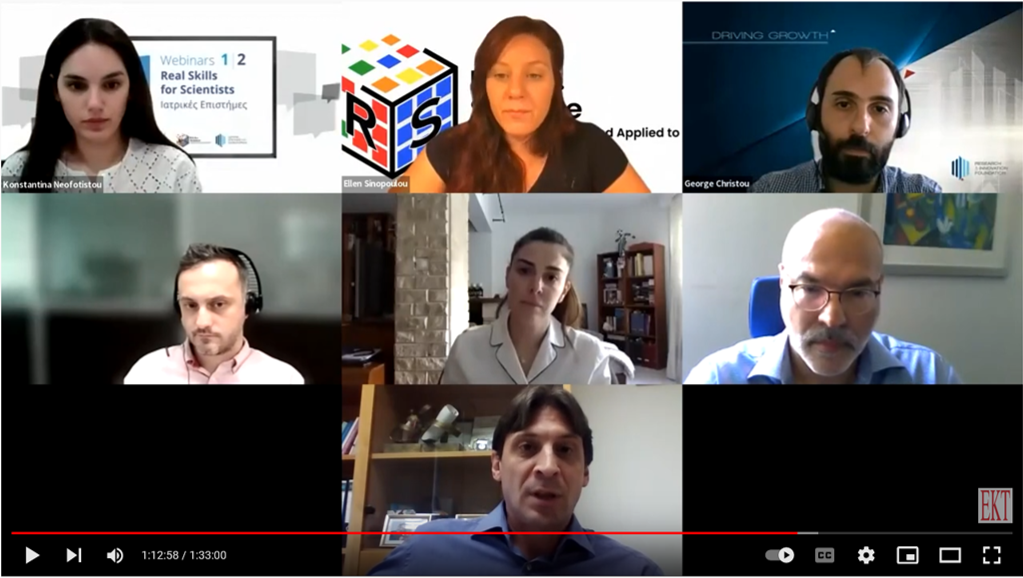
After the short greeting of the organisers, Dr. Dimitris Papadopoulos took the floor and shared his experiences from his business career with Hermes Healthcare, noting that: ‘The road to success is not just two points, beginning and end, which you connect with an ascending line, rather it is a process of constant revision both personal and professional, so that in the end you can reach your goal and success. It involves a lot of turmoil and a lot of emotions’.
Then, Dr. Anna Maria Fandel, with many years of experience in researching new drugs, shared the professional prospects after graduation, as well as sources of funding for all stages of the educational path. At the same time, she said: ‘From all this path you acquire soft skills. It does not mean that because I have studied or dealt with something specific I should look for a job that corresponds to it exactly. There are many innovative ideas, and in my opinion the academic course gives someone soft skills, and the opportunity to learn your limits, how to overcome them and offers you a creative way of thinking.’
George Megas, presented the services and benefits EIT Health offers members through a network of companies and organisations for innovation in the field of health, for which EKT acts as a hub for Greece, as well as the new pioneering project SymbIASIS, implemented by EIT Health and co-ordinated by EKT, with the aim of enhancing the dialogue between hospitals and startups in the field of health, the exchange of knowledge and experience, networking and exploring collaborations to develop innovative products and services. ‘With the support of EKT and EIT Health, more than 80 companies have received funding which supports startups or students and graduates in the field of health for training in innovation and entrepreneurship,’ said G. Megas
Finally, Prof. Triantafyllos Stylianopoulos, shared his own career path with the participants, and provided useful information for finding funding through the European Research Council (ERC grants), as he has twice received this type of funding. Referring to that, he pointed out that for the realisation of his research objectives: ‘ERC Grants are fellowships, submitted by one person, and are based on academic excellence, which is the only criterion. Excellence in the applicant’s CV and the proposal submitted are essential. Also, the amount of funding is quite high, that is, for those who are starting now (starting grants) the funding is 1.5 million euros and it increases depending on the level you are at.’
Throughout the webinars, the audience were able to ask the speakers live questions, which were answered at the end of each webinar. In addition, participants could take part in interactive polls about their field of study, the grants/scholarships they have received, and the country from which they are attending the webinar.
The webinars were co-ordinated by Konstantina Neofotistou, from EKT and the ‘Knowledge and Partnership Bridges’ Initiative, Dr. Eleni Sinopoulou, founder of the scientific professional orientation platform R.E.A.L. Science and George Christou, Scientific Officer from Cyprus.
Watch the video of the 2nd webinar of Real Skills of Scientists- Medical Sciences. Webinar 2: Access to finance, networking, entrepreneurship
About the organisers
National Documentation Centre (EKT)
The National Documentation Centre (EKT), a supervised body of the Ministry of Digital Governance, plays an active role in the ‘National Coalition for Digital Skills and Jobs’. In collaboration with reputable bodies and in ongoing dialogue with the educational, research and academic community,
EKT develops infrastructure and services, promoting knowledge, research and innovation in the digital space. EKT implements the ‘Knowledge and Partnership Bridges’ initiative for the networking and collaboration of Greek scientists, researchers and professionals around the world.
R.E.A.L. Science
R.E.A.L. Science is a career guidance platform for schools and universities in which Greek volunteer scientists from Greece and around the world participate. The leader and creator of this voluntary action is the neuroscientist Dr. Eleni Sinopoulou, who works at the University of California in San Diego, USA.
Research and Innovation Foundation
The Research and Innovation Foundation (RIF) is the national body responsible for supporting and promoting research, technological development and innovation in Cyprus. Its mission is to shape the conditions and requirements that favour the development of research, technology and innovation in Cyprus. Through innovative actions and programmes, it strengthens the domestic ecosystem of research and innovation, contributes to strengthening the competitiveness of the Cypriot economy and develops co-operation and interconnection with the international research and business community.
Links
- Watch the 1st webinar (19/5/22) in Greek
- Watch the 2nd webinar (26/5/22) in Greek
- Participants' Satisfaction Survey (Greek)
- Real Skills for Scientists – Life Sciences (article in Greek)
- Real Skills for Scientists - Computer Science (article in Greek)
- Real Skills for Scientists - Humanities (article in Greek)
- Real Skills for Scientists - Natural Sciences and Mathematics (article in Greek)








